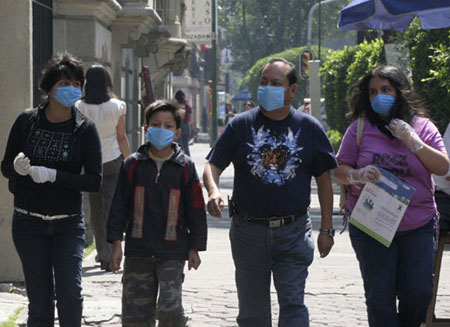Authorities in Mexico urged people to avoid hospitals unless they had a medical emergency, since hospitals are centers of infection. They also said Mexicans should refrain from customary greetings such as shaking hands or kissing cheeks. At Mexico City's international airport, passengers were questioned to try to prevent anyone with flu symptoms from boarding airplanes and spreading the disease.
|

Mexican wear masks as they walk along a street in Mexico City April 24, 2009. The majority of the people killed in Mexico's fatal flu outbreak were adults between 25 and 45 years old, a Mexican health official said on Friday. [Agencies]
|
Epidemiologists are particularly concerned because the only fatalities so far were in young people and adults.
The eight US victims recovered from symptoms that were like those of the regular flu, mostly fever, cough and sore throat, though some also experienced vomiting and diarrhea.
US health officials announced an outbreak notice to travelers, urging caution and frequent handwashing, but stopping short of telling Americans to avoid Mexico.
Mexico's Health Secretary Jose Angel Cordoba said 68 people have died of flu and the new swine flu strain had been confirmed in 20 of those deaths. At least 1,004 people nationwide were sick from the suspected flu, he said.
The geographical spread of the outbreaks also concerned the WHO — while 13 of the 20 deaths were in Mexico City, the rest were spread across Mexico — four in central San Luis Potosi, two up near the US border in Baja California, and one in southern Oaxaca state.
Scientists have long been concerned that a new flu virus could launch a worldwide pandemic of a killer disease. A new virus could evolve when different flu viruses infect a pig, a person or a bird, mingling their genetic material. The resulting hybrid could spread quickly because people would have no natural defenses against it.
Still, flu experts were concerned but not alarmed about the latest outbreak.
"We've seen swine influenza in humans over the past several years, and in most cases, it's come from direct pig contact. This seems to be different," said Dr. Arnold Monto, a flu expert with the University of Michigan.
"I think we need to be careful and not apprehensive, but certainly paying attention to new developments as they proceed."
The CDC says two flu drugs, Tamiflu and Relenza, seem effective against the new strain. Roche, the maker of Tamiflu, said the company is prepared to immediately deploy a stockpile of the drug if requested.
Both drugs must be taken early, within a few days of the onset of symptoms, to be most effective.

